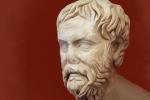A Reply to Andrei Mirovan

Andrei Mirovan: Pyrrhonism: Some Clarifications
Compared to other Hellenistic schools of thought, like Stoicism and Epicureanism, Pyrrhonism was systematically neglected throughout the history of Western philosophy…
I would firstly like to thank Andrei Mirovan for his study of my short essay and for taking the time to write a detailed and constructive reply. I appreciate it. Below are my responses to his specific criticisms.
“Pyrrho’s works do not survive.” Mirovan points out that this is a misleading statement as later authors of the ancient tell us that Pyrrho did not commit his philosophy to writing.
Good point. I should simply have said that Pyrrho did not put his teachings into writing.
“I shall use the words ‘Pyrrhonian scepticism’ or ‘radical scepticism’ to apply to any philosophy that does not escape an infinite regress.” Mirovan argues that I should more accurately have said “I shall use the words ‘Pyrrhonian scepticism’ or ‘radical scepticism’ to apply to any philosophy which argues that no non-Pyrrhonian or dogmatic position can really escape an infinite regress.”
I should have made it clearer that strictly speaking my viewpoint is Pyrrhonian in its inspiration but my priority is not to replicate Pyrrho’s philosophy. I should then have said something like: “I shall use the words ‘Pyrrhonian scepticism’ or ‘radical scepticism’ to apply to any philosophy which argues that no philosophy can completely escape an infinite regress.”
If I understand Mirovan correctly, instead of “the same infinite regress as preoccupied Pyrrho” he would prefer something like “the same infinite regress as preoccupied Pyrrhonism according to Sextus’s Outlines of Pyrrhonism”
Okay.
“Pyrrho and his followers believed that their stance was of practical benefit, providing a guide as to how to live. They believed that suspending judgement about any claim to certain knowledge was conducive to peace of mind, to ataraxia (detached serenity).”
Mirovan points out that as Pyrrho is reported to have said we should remain without beliefs this would be better expressed as: “It appeared to Pyrrho and his followers that their stance was of practical benefit, providing a guide as to how to live. It seemed to them that suspending judgement about any claim to certain knowledge was conducive to peace of mind, to ataraxia (detached serenity).”
Yes. Good point. That would be a better way of putting it.
A point of significant disagreement. “Yes, Pyrrho was concerned with practice but … he tended to assume that taking the correct approach in epistemology would act as a starting point to clear away any problems in the practical sphere.”
Now what I should have said here is “metaphysics and epistemology”, in line with a couple of lines earlier, rather than just “epistemology”. But, either way, Mirovan contests the point.
However, the quotation he uses to contest the point (from Aristocles) does not seem to do the work he asks of it. Rather, it seems to back my point: “Whoever wants to live well (to achieve eudamonia) must consider these three questions: First [my emphasis], how are pragmata (things, affairs, topics) by nature?” That is a metaphysical question.
I suspect that on this point we will have to agree to differ.
Mirovan criticises the following sentence: “In summary … the impracticality of achieving ataraxia is not intrinsic to radical scepticism but rather is intrinsic to the impractical elevation of metaphysics and epistemology above all other branches of philosophy”
He makes the point that previously I criticised the impracticality of achieving ataraxia through epoché whereas now, in this sentence, I seem to be criticising the impracticality of achieving ataraxia tout court.
That seems to be a fair criticism but fairly easily addressed. I think I would be happy to insert “(by epoché)” after the words “achieving ataraxia”.
I do not do justice to the intellectual relations between Greek Pyrrhonism and Indian Buddhism.
That is true – mainly owing to my ignorance of Buddhism I’m afraid. However, I do raise the possibility of Buddhist influence on ancient Greek scepticism and I thank Mirovan for his further references to this subject.
Why entitle the essay ‘In Praise of Pyrrhonian Scepticism’?
My position is that in metaphysics I am attracted to the Pyrrhonian view that no dogmatic position can escape an infinite regress; whereas in the moral sphere I am more attracted to Zhuangzi’s position. As I do not wish to elevate metaphysics above moral philosophy or vice versa I could (and perhaps should) have entitled the essay ‘In Praise of Pyrrhonian and Zhuangzian Scepticism’; however, I felt that that did not have such a nice (aesthetically satisfying) ring to it. So, I thought I would refer to Pyrrhonian scepticism in the title and then set out a fairly loose definition of Pyrrhonian scepticism. I hope my liking for a good title has not come at a philosophical expense but perhaps it has.
“Having defended radical scepticism from the criticism that it is an impediment to philosophical progress …”
But, as Mirovan points out, the article has not defended radical scepticism from the accusation that it is an obstacle to philosophical progress. Rather it has challenged the idea of philosophical progress altogether.
In defence, I would argue that by challenging the idea of philosophical progress I have indirectly defended radical scepticism.
Mirovan’s criticisms reveal many points on which I might have expressed myself more clearly, and some places where I could have been more historically accurate, but I stand by the essay’s main argument.
◊ ◊ ◊

Stephen Leach is an Honorary Senior Fellow at Keele University, UK. He writes on themes in philosophy, archaeology, art history and human evolution.
Academia.edu page: Stephen Leach – Academia.edu
Stephen Leach on Daily Philosophy:
Cover image by Joanna Kosinska on Unsplash.





